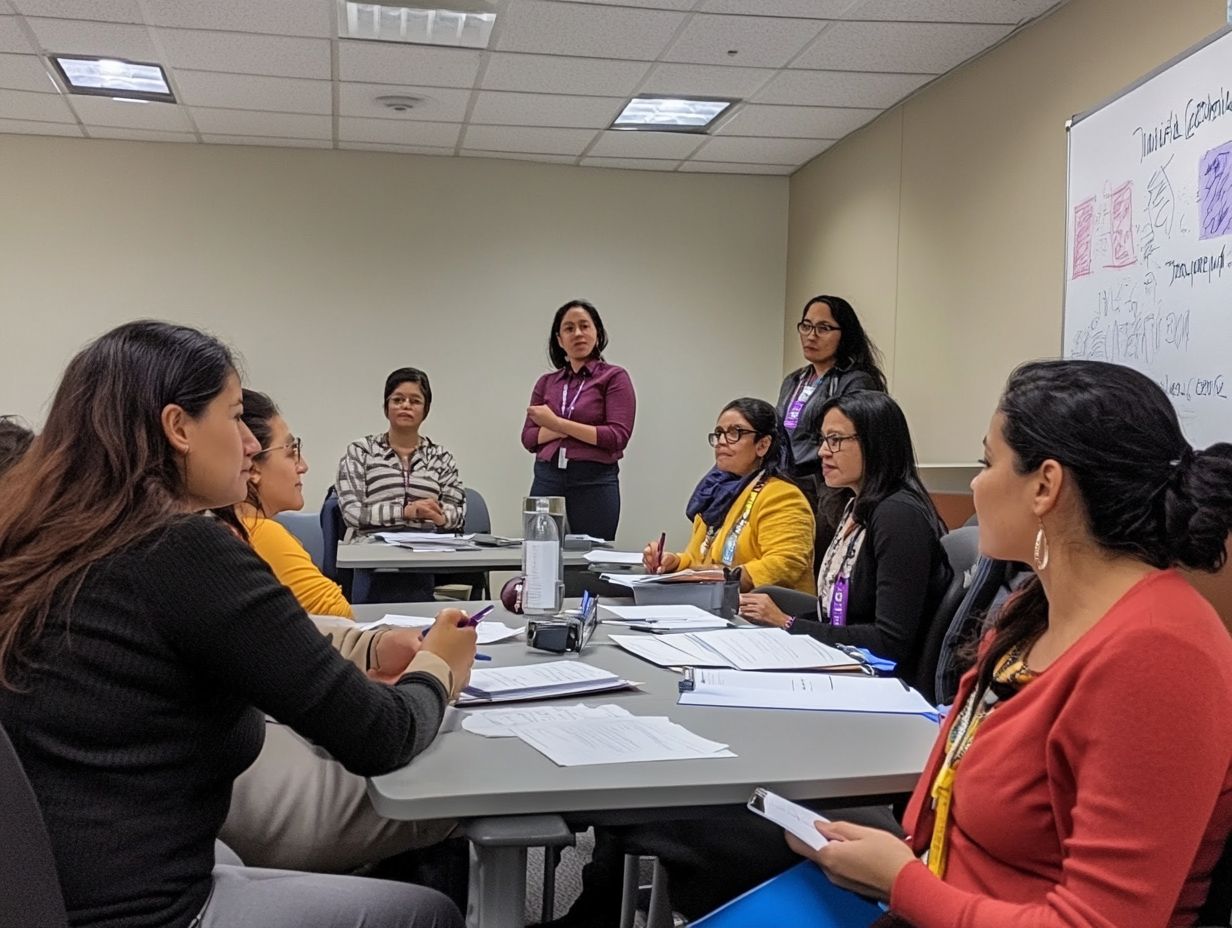Understanding the Certification for Medical Interpreters
In today’s diverse healthcare landscape, effective communication between patients and providers is essential, especially for those who speak different languages. Medical interpreting is key in ensuring that everyone receives the care they deserve.
This article delves into the significance of certification for medical interpreters, highlighting the benefits, types, and requirements associated with it. You’ll also find essential study tips to help you prepare for the certification exam, along with insights on how to maintain your credentials.
Whether you’re considering a career in medical interpreting or seeking to enhance your existing skills, this guide is tailored for you.
Contents
- Key Takeaways:
- Importance of Certification
- Benefits of Being a Certified Medical Interpreter
- Types of Certification
- National Certification vs State Certification
- Requirements for Certification
- Preparing for the Certification Exam
- Maintaining Certification
- Frequently Asked Questions
- What is the purpose of the certification for medical interpreters?
- Who can get certified as a medical interpreter?
- What types of certification are available for medical interpreters?
- How long does it take to become certified as a medical interpreter?
- Is certification required to work as a medical interpreter?
- How do I maintain my certification as a medical interpreter?
Key Takeaways:

Being a certified medical interpreter is crucial for providing accurate and professional language services in healthcare. National certification is recognized across the country, while state certification may be required in specific regions or settings. Maintaining certification through continuing education and renewal is necessary for staying updated and improving skills as a medical interpreter.
What is Medical Interpreting?
Medical interpreting serves as a vital link between healthcare providers and patients who speak different languages. It bridges communication gaps with skill and precision.
This specialized role demands a strong grasp of medical terminology and a deep understanding of healthcare systems. Your primary objective is to facilitate effective patient care, ensuring that communication during medical appointments and procedures is clear and accurate.
In our increasingly multicultural society, your role as a medical interpreter becomes essential. You tackle ethical dilemmas and promote equitable access to quality care for every patient, regardless of their language background.
In various healthcare settings whether hospitals, clinics, or telehealth services effective medical interpretation is crucial. It helps reduce misunderstandings that can lead to improper treatment or medication errors.
As a healthcare interpreter, you are expected to uphold stringent interpretation standards. You prioritize confidentiality and respect cultural nuances. You serve as an advocate for patients, ensuring their voices resonate clearly while accurately conveying information from healthcare providers.
The importance of medical interpreting also extends to public health initiatives. Your ability to convey community health messages enables diverse populations to make informed health choices. Your work can change lives every day!
Importance of Certification
Certification in medical interpreting is essential for establishing your professional credibility. It ensures the highest quality of service in healthcare communication.
It signifies that you have met the rigorous standards set by esteemed organizations like the Certification Commission for Healthcare Interpreters (CCHI) and the National Board of Certification for Medical Interpreters (NBCMI).
By obtaining national certification, you validate your skills in medical terminology, language proficiency, and ethical standards. These key components are vital for delivering effective patient care and navigating complex healthcare environments.
To learn more about pursuing certification or to explore additional resources on medical interpreting, take the next step in your professional journey!
Benefits of Being a Certified Medical Interpreter
Being a certified medical interpreter offers a wealth of benefits that elevate your career and improve the quality of healthcare services for patients.
Getting certified, like the Certified Medical Interpreter (CMI) credential, boosts your credibility and opens new job opportunities. Healthcare professionals often view certified medical interpreters as more competent, which leads to better patient care and trust in the interpreting process essential for navigating ethical dilemmas and ensuring clear communication in medical settings.
These advantages also include greater job security, as many healthcare facilities prioritize certified professionals to meet regulatory standards.
This professional status unlocks various continuing education opportunities, supporting your commitment to lifelong learning and skill enhancement. As a certified medical interpreter, you can join interpreter registries, increasing your visibility to potential employers while connecting you with a network of peers and resources for ongoing support.
Together, these factors can help you thrive in this exciting and challenging industry, ultimately benefiting both your career trajectory and the patients who rely on your services for effective communication.
Types of Certification

You ll find a range of certifications for medical interpreters, primarily divided into national and state categories, each with unique guidelines and levels of recognition.
National certifications, like those from the Certification Commission for Healthcare Interpreters (CCHI) and the National Board of Certification for Medical Interpreters (NBCMI), are highly regarded and often favored by employers nationwide.
State certifications, however, can differ considerably in requirements and recognition, tailored to meet regional needs and regulatory standards.
Understanding these differences is important for you as an interpreter candidate, helping you navigate your career path with confidence and clarity.
National Certification vs State Certification
National certification and state certification serve distinct purposes, and it s essential for you as a prospective medical interpreter to understand their unique requirements.
National certifications, like those from CCHI and NBCMI, establish a recognized standard that places you on a competitive level across various states, potentially unlocking a wider range of job opportunities.
On the other hand, while state certifications may advantage local interpreters in specific markets, they can also lead to fragmentation and confusion regarding qualifications across state lines. Understanding these variations is crucial for advancing your career.
Align your qualifications now to stand out! This awareness helps you make informed decisions about your certification journey and enhances your value in an industry that increasingly prioritizes quality and accountability.
Requirements for Certification
The requirements for certification as a medical interpreter involve a comprehensive set of educational and experiential standards that you must meet to showcase your competence.
Typically, this includes completing formal interpreter training programs, proving language proficiency, and having a strong understanding of medical knowledge and terminology.
It s crucial for you to familiarize yourself with the specific certification criteria established by organizations like CCHI and NBCMI. These benchmarks ensure that only the most qualified candidates enter the field, ultimately enhancing communication within healthcare settings.
Educational and Experience Requirements
The educational and experience requirements for becoming a certified medical interpreter can vary widely depending on the certification pathway you choose. Typically, you ll need to complete specific educational programs in interpretation or healthcare, which provide comprehensive training in medical terminology and ethics.
Gaining experience in a healthcare setting or an internship enhances your qualifications. It prepares you to handle complex healthcare communication.
In addition to formal education, consider enrolling in specialized training programs focused on medical interpreting, often available through community colleges and online platforms. Engaging in hands-on internships or volunteer experiences in hospitals and clinics further refines your skills, allowing you to interact directly with patients and medical staff.
This experience builds your confidence. It also deepens your understanding of various healthcare settings.
Obtaining certification from recognized organizations, such as the National Board of Certification for Medical Interpreters (NBCMI), can significantly improve your job prospects. It’s essential to be aware of the various paths and requirements available in this nuanced field to set yourself up for success.
Preparing for the Certification Exam

Preparing for the certification exam is an essential step for aspiring medical interpreters, demanding dedicated study and practice to secure success.
You should take the time to familiarize yourself with the exam’s structure and content, which generally encompasses language proficiency tests, assessments on medical terminology, and situational ethics.
Employing effective study strategies like joining study groups, engaging with practice exams, and utilizing available resources can greatly boost your chances of passing the interpreter exams on your first attempt.
Study Tips and Resources
Effective study tips and resources are essential for your success as a medical interpreter candidate preparing for certification exams. By utilizing a blend of books, online courses, and practice exams, you can significantly enhance your understanding and retention of medical terminology and ethical standards.
Engaging in continuing education units (CEUs), which are essential for your professional growth, and workshops from organizations like the International Medical Interpreters Association offers invaluable insights and keeps you updated on best practices in the field.
Joining peer study groups fosters collaboration and allows you to share insights or tackle challenging concepts together. You ll also find various online platforms that provide interactive simulations and real-life case scenarios, helping you refine your skills in a controlled environment.
Networking through professional associations not only opens the door to mentorship opportunities but also keeps you informed about upcoming seminars and conferences. Ongoing professional development is vital! It keeps your skills sharp and prepares you for new challenges.
Maintaining Certification
Maintaining your certification as a medical interpreter is crucial for ensuring that you remain professionally competent and aligned with the latest industry standards.
This process requires you to fulfill continuing education requirements, which typically involve earning a specific number of Continuing Education Units (CEUs) within a designated timeframe.
Renewing your certification not only keeps you updated on medical knowledge and ethical standards but also reinforces your dedication to delivering exceptional language services in the healthcare sector.
Continuing Education and Renewal Requirements
Continuing education serves as a cornerstone for maintaining your certification as a medical interpreter, with specific renewal requirements set forth by certifying organizations.
You need to accumulate a designated number of CEUs (Continuing Education Units) within a defined timeframe to showcase your ongoing commitment to professional development and to keep pace with industry advancements.
This ongoing education sharpens your skills and boosts the quality of healthcare interpreting, enhancing patient-centered care.
To meet these CEU requirements, you can engage in a variety of accredited activities, such as:
- Workshops
- Online courses
- Conferences focused on healthcare and language services
You can also earn CEUs through professional reading or by mentoring others, providing you with a diverse array of options that cater to different learning preferences.
Staying current in this dynamic field isn t just beneficial for your personal growth; it significantly impacts communication effectiveness in medical settings, ultimately improving patient outcomes and fostering trust between healthcare providers and their diverse patient populations.
Frequently Asked Questions

What is the purpose of the certification for medical interpreters?
The purpose of the certification for medical interpreters is to ensure that individuals have the necessary skills and knowledge to effectively interpret in medical settings. It also helps to standardize the qualifications and competencies of medical interpreters.
Who can get certified as a medical interpreter?
Individuals who are fluent in two or more languages and have completed a formal training program in medical interpreting can get certified as a medical interpreter. They must also demonstrate proficiency in both languages and pass a certification exam.
What types of certification are available for medical interpreters?
There are several types of certification available for medical interpreters, including national certifications such as the National Board of Certification for Medical Interpreters (NBCMI) and the Certification Commission for Healthcare Interpreters (CCHI). There are also state-specific certifications and certifications offered by professional organizations.
How long does it take to become certified as a medical interpreter?
The time it takes to become certified as a medical interpreter can vary depending on the individual’s previous experience and education. Typically, it can take anywhere from a few months to a year to complete the necessary training and pass the certification exam.
Is certification required to work as a medical interpreter?
While certification is not always mandatory, many medical facilities and employers prefer to hire certified medical interpreters. In some states, certification may also be required for certain medical interpreting positions. Additionally, certification can help you stand out in a competitive job market.
How do I maintain my certification as a medical interpreter?
To maintain your certification as a medical interpreter, you may be required to complete continuing education courses or workshops. This helps to ensure that you stay updated on industry standards and best practices. You may also need to renew your certification periodically by retaking the certification exam or fulfilling other requirements set by the certifying organization.





